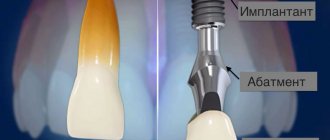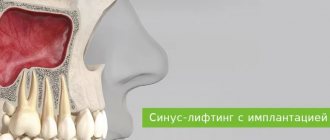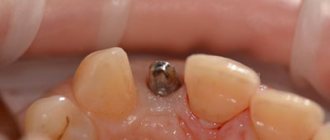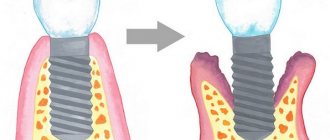Teeth go numb quite often. The cause of the symptom is the trigeminal nerve (nervus trigeminus). More precisely, its damage or other violations associated with it. Pathology of the trigeminal nerve most often develops due to serious errors made during dental procedures - installation of dentures, tooth extraction, and their treatment. Numbness can be caused by neuroses, inflammation, or trauma. To eliminate this symptom, various types of treatment may be needed:
- Medicines
- Ultrasonic
- Using laser
- Surgical
- Physiotherapeutic
Next, methods for treating dental numbness will be described in more detail.
Causes
There are a large number of factors that provoke loss of sensitivity in the lower or upper teeth. These include:
- mechanical injuries;
- periodontitis and other tooth root pathologies;
- malocclusion , which disrupts the functioning of the temporomandibular joint;
- errors during implantation and dental treatment;
- damage to the canal in the area of the mandibular nerve;
- stretching, partial or complete rupture of the nerve itself;
- severe emotional stress;
- outflow of blood from the vessels of the facial area;
- syndrome of an allergic reaction to a sharp decrease in ambient temperature.
All of these problems can provoke, in addition to jaw numbness, pain or, conversely, loss of sensitivity in the tongue, cheeks or gums. Excessive salivation may be an accompanying symptom.
Paresthesia is a condition of numbness of the teeth. The pathology is accompanied by burning, tingling, and loss of sensitivity of the lower or upper row of teeth.
Skull tomography, x-rays, and vascular Doppler sonography help identify the cause of the disease.
Treatment includes surgical correction of the nerve, electrophoresis, laser therapy, exposure to diadynamic currents, and UHF procedures.
Any movement of the jaw can be accompanied by unpleasant sensations, including severe pain. If paresthesia is due to the body's reaction to cold, swelling and rashes or blisters may form.
In what cases is pain in a pulpless tooth dangerous?
DentoSpas Clinic recommends contacting your doctor again if the following symptoms appear:
- the pain becomes sharp, throbbing, intensifies, does not weaken, and may be more pronounced at night;
- painkillers prescribed by the doctor do not work or relieve pain only slightly;
- there is sensitivity, discomfort when contacting cold;
- the patient has a fever and other symptoms of illness: weakness, headache;
- the gums become very swollen and inflamed;
- discomfort persists for a long time or returns some time after treatment (the tooth begins to hurt again).
These signs indicate complications of endodontic treatment. Pain may have several causes.
Reappearance of infection. Occurs if the infected tissue was not completely removed during the initial treatment. A source of infection remained inside the crown, under the filling, and tissue destruction continued.
Errors during filling. If the root canals are not filled tightly or completely, the voids remaining inside them threaten the re-development of infection. Microbes penetrate into them through surrounding tissues, causing inflammation. The pain comes from him. Another possible mistake is that the canals are not filled with filling material to the full depth. To exclude it, the DentoSpas clinic performs control radiography and uses an apex locator to assess the depth of the canals. There should be no voids left at the root apex after filling - this is dangerous due to the formation of granulomas and cysts, and destruction of hard tissues.
The filling material has gone beyond the root tip. This occurs if it is squeezed out through the apical foramen. Dental cement in this case hardens in the periodontal tissues, squeezing the nerves and impairing blood circulation. Because of this, inflammation begins and severe pain appears.
Perforation of the root walls. When cleaning root canals, the root walls may be perforated with an endodontic instrument. At the site of the hole, the tissue becomes infected and inflamed. When filling, perforation is dangerous due to the filling material leaving the root canal.
A fragment of the instrument remains inside the channel. This is a rare mistake. Such debris is clearly visible on control X-ray photographs. If they still remain inside the canal, it becomes clogged, making it more difficult to treat. Because of this, infected tissue remains at the root tip, which provokes re-inflammation.
Complications can arise not only due to treatment errors:
- allergy. Individual sensitivity to the components of the filling material or the medications used, their intolerance can provoke the appearance of pain, swelling, and discomfort immediately after treatment. Such symptoms do not go away on their own, they gradually intensify, and severe inflammation begins;
- damage to the adjacent tooth. The pain in it can spread along the gums and radiate into the pulpless tooth;
- trigeminal nerve injury. It occurs if it passes next to a pulpless tooth and was touched during its treatment. In this case, the pain is shooting, may be accompanied by numbness, and spread throughout the jaw.
Diagnostics
In most cases, the dentist determines the cause of the condition visually or after interviewing the patient. However, sometimes additional research is required to clarify the diagnosis:
- tomography of the cranium;
- Dopplerography of blood vessels;
- X-ray of the jaw.
Competent treatment is impossible without establishing the exact cause of the syndrome, so if a doctor prescribes diagnostic procedures, you should not refuse them, otherwise the effectiveness of therapy can be noticeably reduced.
The most serious causes of paresthesia are injuries to the trigeminal nerve as a result of blows, falls and dental implants.
After such injuries, a preventive examination by a dentist is mandatory, even if the patient seems to be fine.Early diagnosis will help eliminate the consequences quickly and with a high degree of success.
Dentist
Novikova Olga Alexandrovna
8 years of experience
Basic treatment methods
Tooth numbness is usually treated by a dentist. First of all, you should find out the cause of the syndrome. If you notice signs of paresthesia, you should make an appointment with a dentist.
Self-medication is dangerous with complications!
Attention
Despite the fact that our articles are based on trusted sources and have been tested by practicing doctors, the same symptoms can be signs of different diseases, and the disease may not proceed according to the textbook.
Pros of seeing a doctor:
- Only a specialist will prescribe suitable medications.
- Recovery will be easier and faster.
- The doctor will monitor the course of the disease and help avoid complications.
find a doctor
Do not try to treat yourself - consult a specialist.
In some cases, the syndrome is corrected without surgery. Sometimes it will be necessary to perform an operation using one of the methods of jaw microsurgery.
The main goal of therapy in both cases is to restore sensitivity to the jaw nerve. It is extremely important to take into account that if the disease continues for three months, the likelihood of successful treatment is noticeably reduced, and if paresthesia persists for more than one year, it becomes almost impossible to completely restore tooth sensitivity.
Why can our articles be trusted?
We make health information clear, accessible and relevant.
- All articles are checked by practicing doctors.
- We take scientific literature and the latest research as a basis.
- We publish detailed articles that answer all questions.
If the face is hypothermic, doctors recommend taking antihistamines and trying to increase body temperature to increase blood flow.
During treatment in a dental office or during the rehabilitation period after surgical correction of the mandibular nerve, physiotherapeutic treatment procedures are of great benefit:
- electrophoresis, which is usually used together with painkillers;
- UHF procedures;
- laser therapy;
- exposure to affected areas with diadynamic currents.
All these procedures are not mandatory and are prescribed based on the doctor’s opinion of their appropriateness.
Solutions to the problem
Treatment of dental stiffness should be carried out taking into account the cause of the disease. Damage to the jaw nerve can also be eliminated non-surgically, it all depends on what factors caused it. The main condition for successful treatment is timely provision of assistance. Other treatment options are microsurgery, physiotherapy, and taking special medications.
If your teeth have been numb for more than three months, it will be difficult to restore their sensitivity. Therefore, the sooner you seek professional help, the better.
In addition to taking special medications, the doctor may prescribe physiotherapeutic techniques to the patient. Main options:
- electrophoresis of teeth with calcium (it is applied to the affected part of the face);
- UHF;
- dynamic currents;
- laser therapy. A similar technique can be used to eliminate caries. Find out more about laser treatment for caries here.
The treatment program in each case is drawn up individually, the doctor considers the advisability of using certain therapeutic techniques for a particular patient.
At the moment, different methods of treating the trigeminal nerve are used, and they all have their own characteristics. In the initial stages, anti-seizure medications are often prescribed to prevent the seizure from progressing. Doctors may prescribe antispasmodics, sedatives, and vascular medications.
Sometimes trigeminal neuralgia is treated with folk remedies - for example, amphibian knotweed decoction or yarrow infusion. You can target the affected area with a laser - this method is applied across the fields in the area where the nerve branches exit the skull, cutaneously.
Surgical treatment of trigeminal neuralgia is quite complex, and doctors do not agree on its effectiveness. The first method of surgical therapy consists of trephination of the cranial fossa from the back and restoration of the correct location of the roots relative to the arteries and veins.
During compression, they are separated - a gasket is placed between the spine and the vessels, which prevents the vessels from affecting the spine. But there is a nuance here - the effect of blood vessels on the nerve is not always the main cause of the disease, so such actions may simply not bring the desired results.
The second method of surgical therapy is percutaneous radiofrequency destruction of the roots. It involves the impact of thermal energy when high-frequency currents pass through biomaterials. This method has a number of advantages compared to the first - the main ones are low trauma and the use of local anesthesia, which means quick recovery.
It is precisely because of the high degree of trauma that surgical methods of treatment are used relatively rarely.
Treatments for tooth numbness depend on the cause. If the jaw nerve is damaged, the problem can be solved with conservative methods, but sometimes surgery will be required. Much depends on how long this situation lasts. For example, if numbness of the teeth lasts longer than 3 months, then it is difficult to eliminate this phenomenon even with the use of modern medications.
For neuropathy, the doctor prescribes anticonvulsants (carbamazepine or its analogues - Tegretol and Finlepsin). For allergic reactions, antihistamines are used, but they are also needed to enhance the effect of anticonvulsants. For this purpose, agents are used in the form of a solution for intramuscular injection, for example Diprazine.
The doctor may prescribe various physiotherapeutic procedures. Options such as ultraphonophoresis (hydrocortisone is administered simultaneously) and ionogalvanization, which requires the use of novocaine, have proven themselves to be effective.
Sometimes surgery is performed to relieve the trigeminal nerve from decompression caused by compression of the vessels.
If the reason is improper dental procedures, you need an anti-inflammatory drug, for example Nimesil. Regardless of the cause of pain, local application of lidocaine or anesthetic ointment is indicated.
If the problem is caused by poor nutrition, vitamin complexes are prescribed, but only based on the results of the examination, when it is determined which vitamins are missing. A special diet is also prescribed, this also applies to allergic reactions.
We suggest you read: Causes of white coating on the tongue of an adult
For injuries, in addition to pain relief, chondroitin and glucosamine are prescribed for faster restoration of cartilage and bone tissue. This is also useful in cases where numbness is caused by osteochondrosis.
Numbness of the jaw is a rare symptom that occurs mainly with damage to nerves, blood vessels and due to dental problems. Most often the lower jaw goes numb, and the patient may experience both minor discomfort and difficulty eating and speaking. If a problem arises, first of all you need to contact a therapist and undergo an examination.
Numbness during dental implantation
Incorrectly performed dental implantation is one of the most common factors leading to numbness of the front teeth. Sometimes the main reason is unsuccessful anesthesia, since during the injection process the needle may well damage the jaw nerve and lead to loss of its sensitivity.
The syndrome occurs as a result of erroneous determination of the length of the implant. In this case, after the procedure of its implantation, the nerve is either injured or pinched.
There are several stages of numbness, which can be caused by a dentist’s mistake during installation of implants.
At the stage of neuropraxia, only partial numbness is observed, which usually lasts several hours and disappears either on the day of surgery or the next morning.
At the stage of axonotmesis, symptoms persist for about a month and are accompanied by pain.
The most severe form is neurotmesis, in which numbness is accompanied by the appearance of a scar and disappears no earlier than two months after implantation.
All of these listed forms are not the norm, so the appearance of any stage of jaw numbness should be discussed with your doctor and undergo an additional course of treatment if necessary.
Main causes of nerve damage during implant placement
Damage to the maxillary or mandibular processes of the trigeminal nerve, which is the main cause of long-term numbness of the lips, tongue, and chin after dental implantation, can be caused by an unintentional mistake by the dentist or negligence. Damage to the mandibular nerve, which provokes paresthesia, can occur in the following cases:
- Incorrect selection of implants (chosen too long).
- The specialist has not studied the anatomical features of the jaw and the implanted implant touches the nerve ending.
- Injury to the nerve ending by a needle during the administration of anesthesia or dental instruments during bone preparation.
If numbness in the lower part of the face is caused by injury to the nerve endings during the administration of anesthesia, the discomfort will go away on its own after the nerve fibers heal. Typically, the healing period ranges from 3 months to six months. You can understand that numbness of the lip and chin after implantation is associated with damage to the trigeminal nerve by the presence of the following signs after surgery:
- salivation increases;
- difficulty eating;
- facial expressions and articulation are impaired;
- the sensitivity of the tongue and lips decreases;
- there is pain and discomfort in the implant area;
- numbness is felt on the side where the titanium root is implanted.
Chief physician, Salatsky Dmitry Nikolaevich
Sign up for a free consultation
+7
If the feeling of numbness in the lower jaw does not decrease within several hours after implantation, then an urgent consultation with the doctor who performed the operation is necessary. Only after conducting diagnostic studies will a specialist be able to identify the extent of nerve damage and, based on this, prescribe appropriate treatment.
Prevention
Since the cause is usually mechanical trauma, there are no special preventive methods to protect against the syndrome. However, to minimize the risks of this problem, you should keep an eye on the following things:
- qualifications of the treating dentist and prosthetist;
- availability of free time for proper rest;
- face protection from low temperatures.
Teeth numbness is an unpleasant syndrome that does not go away on its own. If you delay in contacting a doctor, the changes will develop into an irreversible stage. Moreover, paresthesia can act as a symptom of a serious illness. That is why it is worth taking this pathology seriously and starting to eliminate it in a timely manner.










